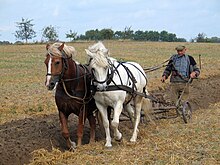Egetkötter
As Egetkötter , Eggeköter or Eggebauer were referred to in the agricultural history of northwest Germany a serf peasants in the village hierarchy was fifth. The name comes from the obligation to serve the landlord with harrowing and plowing. He put a horse that was harnessed to the harrow or plow together with the horse of a second egg farmer.
Those affected often found these services to be a heavy burden and were therefore extremely reluctant to perform. The court files report various disputes about these services, for example about late arrival or lack of work performance. Repeated misconduct even imposed prison sentences.
Kötter were treated according to the principles of Meierrecht and a distinction was made between large, medium, Eget and small kötter. The settlement of new Kötter on a Meierhof had to be approved by the sovereign.
See also
Individual evidence
- ↑ Farm owners and others - keyword: Egetkötter
- ↑ Vollmeier, Großkötter, Kleinkötter and Hoppenplöcker ( page no longer available , search in web archives ) Info: The link was automatically marked as defective. Please check the link according to the instructions and then remove this notice.
- ↑ Farm owners and others - keyword: Kötter

